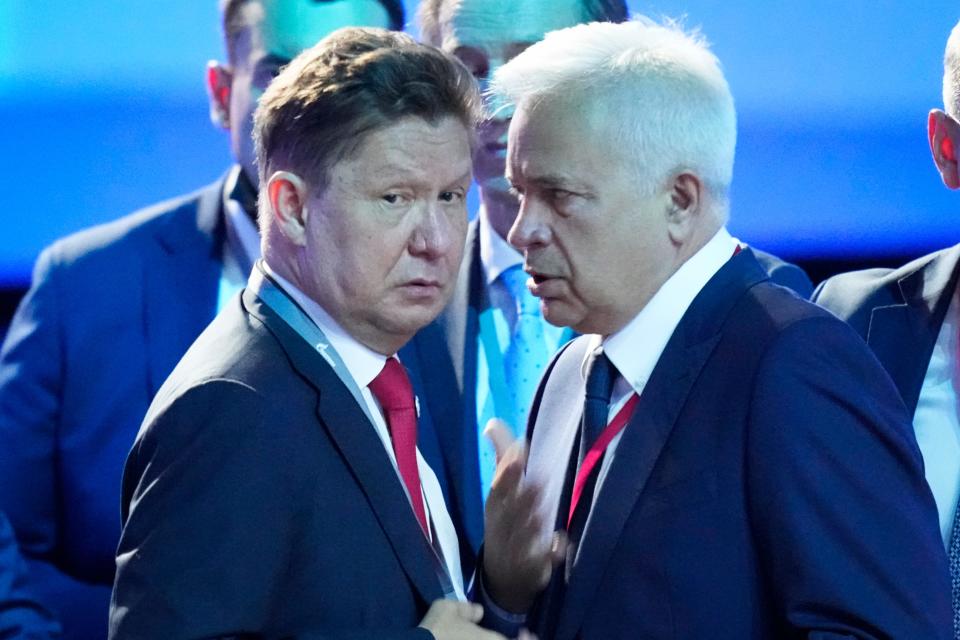This form of government leaves power in the hands of a few: Oligarchies explained
- Oops!Something went wrong.Please try again later.
- Oops!Something went wrong.Please try again later.
Officially, our form of government in the U.S. is a representative democracy. This means citizens vote for their government officials. But Vermont Senator Bernie Sanders is of a different opinion.
“Of course the oligarchs run Russia. But guess what? Oligarchs run the United States as well,” the Democratic Senator said last year. “And it’s not just the United States, it’s not just Russia; Europe, the UK, all over the world, we’re seeing a small number of incredibly wealthy people running things in their favor.”
Wondering what this means in the context of global governments? Here’s everything you need to know about oligarchies, including examples.
What is an oligarchy?
The general definition of an oligarchy is a form of government involving the rule of a few persons or families. According to National Geographic, Greek philosopher Aristotle used the term in contrast to aristocracy (the elite upper class) to describe the rule of a few for “corrupt and unjust purposes.”
One of the more modern uses is the phrase “iron law of oligarchy,” a concept by German sociologist Robert Michels that says democracy is an oxymoron – that it will ultimately fall to the hands of an elite few.
2024 election: Which Senate seats are up for reelection?
Examples of oligarchy
Because oligarchy is often used as a derogatory term for a corrupt government, several countries have been described as such throughout history.
The term oligarch has been most recently used to describe well-connected, influential wealthy Russian business leaders. Before Russian President Vladimir Putin’s rule, a group of Russian oligarchs had control over most of the country’s economy. When Putin rose to power, he offered them a choice of prison or loyalty — the loyal oligarchs “are making bank through extra fat government contracts,” NPR writes.
In 2018, the Trump administration released a list of hundreds of Russian politicians and oligarchs that have "flourished" under Putin, created from publicly available sources of Russian billionaires.
This post-Soviet oligarchy also occurred in Ukraine, but the war is changing that. Many Ukrainian and U.S. analysts told The Washington Post financial losses and government pressure are diminishing the power of this wealthy group. Ukrainian President Volodymyr Zelenskyy signed a “deoligarchization” law in 2021 that cracks down on monopolies and places limits on the political influence of the elite.
China defines itself as a communist "people's republic," though some have called it an oligarchy because leadership has remained in the hands of a few for several decades.
Iran has been called both a theocracy and a clerical oligarchy because of the power clerics hold. In Iran, a Supreme Leader (chosen by an “Assembly of Experts”) runs the country with 2,000 clerical field operatives, according to National Geographic.
In the Philippines, President Rodrigo Duterte’s claim of dismantling the country’s oligarchy garnered criticism from several sides – from those who said there never was a problem, from those who said it’s far from ended and from those who accused Duterte himself of associating with oligarchs, Philstar reports.
The United States has also been called an oligarchy in the past few decades, with one study determining the American economic elite representing business interests have more impact on U.S. policy than the average citizen. Still, others argue that America is more an “imperfect democracy” than an oligarchy.
What are the main forms of government?
While not an exhaustive list, here are some definitions of different types of government seen around the world:
Absolute monarchy: A monarch rules without being hindered by other governing bodies
Anarchy: Lack of governmental authority, a condition of lawlessness or political disorder
Authoritarian: State authority is imposed on citizens' lives
Communist: The state controls the economy with a single party in power. Private ownership is eliminated with a goal of all goods equally shared in a classless society
Democracy: Power is retained by the people
Democratic republic: Citizens vote for representatives who hold governing power
Dictatorship: A ruler or small group wield absolute power without a constitution or laws
Ecclesiastical: Church-administered government
Emirate: Power in the hands of the ruler of a Muslim state, an emir
Monarchy: Supreme power is in the hands of a monarch, usually a king or queen and usually hereditary
Socialism: A central government produces and distributes goods to seek a more just and equitable society
Sultanate: Supreme power rests in the hands of a sultan
Theocracy: A Deity is recognized as supreme leader
Totalitarian: Government subordinates individuals to the state, controlling political, economic and social attitudes, values and beliefs
World's biggest military: Top 10 by budget, active and reserve members
Just Curious for more? We've got you covered.
USA TODAY is exploring the questions you and others ask every day. From "Who controls the Senate?" to "What are the three branches of government?" to "What is ranked choice voting?" – we're striving to find answers to the most common questions you ask every day. Head to our Just Curious section to see what else we can answer for you.
This article originally appeared on USA TODAY: What is an oligarchy? Definition and examples throughout history.


